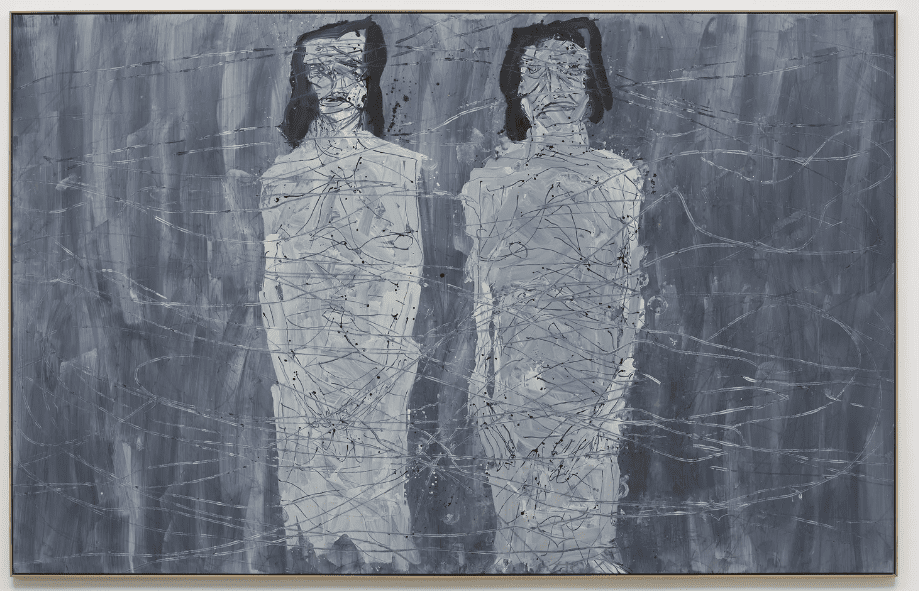Vulpine and ragged, dropping effortlessly from the plaintive minors of her upper range down to throaty growlings all earthy and powerful, Straylings' Dana Zeera throws her voice around in ways that cover the gamut of all that is feminine without ever being girlie.
Set against the wobbling reverb of a bright twanging guitar that never stops to decide whether it's in a support or lead role, the songs draw deeply on Throwing Muses guitar builds, Chrissie Hynde cocky self-assurance, All About Eve flimsy ethereality and the unabashed gynoconfidence of Kim Gordon, Debbie Harry or the Bluebell Knoll era of Cocteau Twins (when Liz Frazer stopped singing about happy little pixies and was actually a bit angry).
archetypal tragic women too big for their small surroundings
Entertainment On Foreign Grounds taunts the reviewer with provocative hints of archetypal tragic women too big for their small surroundings, pouring their heartbreak and frustrations into songs too weary and knowing for the small frames that contained them. Think Polly Styrene, think Billy Holliday or Amy Winehouse.
Or none of them, perhaps think of The Cramps or Polly Harvey and a vocal lucidity that is fully aware but unbroken by it all.
you're sounding like a hyperbolic media student
Five or six songs in and you realise that you're sounding like a hyperbolic media student and that the only possibility is that, as it seems to remind the ear of just about every indie act from the late eighties American midwest to the mid-noughties blue-eyed soul of the Brit School via the shattered femmes fatales of 50s starlets gone bad, perhaps Straylings' sound is actually their own.
Lucky Strikes and Pabst Blue Ribbon filling the empty stretches between one-pump gas stations
So instead we focus on visuals. Allow the iconography of dusty road movies and Vegas chic motelroom psychodramas to paint the pictures onto the inner walls of the synaesthetic imagination.
Laura Dern in an erotic verbal faceoff with a repulsive Willem Dafoe; rusty roadshark cabriolets, the FM dial locked onto 24 hour rock, Lucky Strikes and Pabst Blue Ribbon filling the empty stretches between one-pump gas stations manned by off duty greasers wiping their oil-soaked hands on clean white rags.
Zeera's voice and Oliver Drake's sultry feedback-drenched guitars fit that landscape as neatly as the stack-heeled, bare midriffed, lipliner and hairspray rhinestone party girl tugging a suitcase along the blacktop interstate to the county line. Entertainment On Foreign Grounds DOES THIS to you.
Does this to music writers at any rate. Impossible to describe without lapsing into lists of hackneyed adjectives, aging references and escapist midlife crisis imagery.
Better to let the Bahraini/Austrian singer and London-born guitarist speak for themselves, before the review goes too far into the realms of the catastrophically twee.
Trebuchet: Dana, growing up in Bahrain, your introduction to Western music came via US Navy radio and Filipino karaoke bars. It doesn't sound like the most fertile ground for the kind of indie-rock influences that come through on the album. Have we missed out on something important here? How bad was it really?
Straylings: It was actually really great in a lot of ways. Not a whole lot of influence from the Karaoke bars, but definitely Navy radio and the expats in the country. It was a fertile ground in a way, because people would constantly be coming in and out of Bahrain bringing their influences with them.
Trebuchet: Presumably Bahrain's karaoke bars weren't well-stocked with Throwing Muses, Yeah Yeah Yeahs or PJ Harvey records, yet there are aspects of those bands (or their vocalists at the very least) in your vocal style. Was it a case of moving to London in 2001 and gorging on all the music you heard until something struck a chord, or something that you always had?
Straylings: Yes, definitely, moving to the UK changed things…the availability and access to all these great records really made an impact. But family and friends played a big part in introducing me to a lot of artists back home too… I remember hearing things like Joan Baez and Led Zeppelin early on through my brother….
Trebuchet: The album opens with a song called 'Carver's Kicks', that immediately brings Urge Overkill to mind – partly due to the clanging guitar sound, and partly due to the louche vocal Dana sings on it. Apparently Urge Overkill's producer expressed a liking for the song. How did that come about?
Straylings: Well, we’re very fond of Urge Overkill’s ‘Girl, you’ll be a woman soon’. It’s such a great cover…and that sort of prompted us to get in touch with Kramer about mixing some tracks. He was really positive about things, but timing didn’t work out with each of our schedules in the end unfortunately. He’s been very supportive since though, and said some encouraging things…hopefully the timing might work on the next album….
Trebuchet: Listening to the album on CD, the quality of the mix is obvious. Unlike a lot of recent indie rock music, the lead guitar is really prominent, despite the allure of the vocal. It's very confidently done and gives the record quite a distinctive sound. There are three mixing engineers credited on the album, how did that work? What were you aiming for in the mix by bringing in R.E.M.'s mixing engineer to work on the album?
Straylings: Well, the album was recorded in different stages, and with mix engineers having such different approaches we just wanted to find the right person to get what we were after from the tracks each time. The mixes with Matthew [Ollivier] were all done in the studio together, while the mixes with Sam [Bell]and John [O'Mahony] were actually done via email, as they’re both based in the States…which can be quite time consuming, but also satisfying seeing it take shape. Sam has mixed a lot of live recordings, so he’s great at retaining the character of a live band….
Trebuchet: Given that the mixing and engineering of the album is so polished, it seems that the actual recording was a bit more quirky. Word is that the album was recorded in hallways and basements. Hallways have an unrecognised history in music recording – walking down a hall until the sound becomes mono is a favourite low-tech trick to check if a mix works or not. That said, how was the recording process? What was the most challenging part? What came easily?
Straylings: Yes, some of the drums and guitars were recorded in an entrance hall, but acoustically it was actually a perfect space to use…and also one of those rooms with a good energy. Dana’s brother Mishal came over from New York to produce with us as well, which was invaluable.
We were lucky enough to be able to use the space with few constraints, which gave us a lot of time to experiment with sounds in different rooms, and find what we were looking for. We were also able to use a basement that was really good for vocals and acoustics. I don’t think we ran into too many difficulties, other than perhaps some points in the editing process….deciding whether to include an overdub, or discard it etc.
Trebuchet: There's a growing tendency for bands to mix and master their music towards the media on which it will mostly be played. Often, that means pushing the loudness to the point where there's very little definition, but enough boom to cut through the low-fidelity of YouTube, Spotify, etc. Red Hot Chili Peppers famously mixed Californication with iTunes in mind. I don't get that feeling from Entertainment on Foreign Grounds. How are you hoping the public will experience the album?
Staylings: That’s a good question. Yes, although doing a mix in that way has crossed our minds in the past, it’s not so much a concern for us really. We generally just aim to make the recording the most exciting and immersive it can be…retaining the dynamics and fragility are really important to us as well…so it kind of sounds like the band are there. It’s great when you hear a record and the very quiet passages are as dramatic as the huge walls of sound.
Trebuchet: Oliver gets to let rip on guitars on the album, particularly on 'The Saguaro'. For a while it was starting to look like indie rock was becoming guitar-music for people who don't really like guitars much. Is there a deliberate attempt to reclaim the instrument, or even the concept of a distinctive guitar sound, on the album?
Is it even possible to do so any more – with the range of guitar and effects emulation software available now, can a guitarist really develop their own sound any more?
Straylings: I wouldn’t say we’re trying to make a statement with guitar sounds really… we tend to focus more on the songs and to create parts that support or heighten them in some way. So I guess the sounds are just a part of doing that. Perhaps the role of the instrument has changed recently and will probably always shift, which is a good thing. I suppose the interest in new effects or technology has always been around, but I don’t think it would ever stop people developing their own sound…. I’m sure that’ll always be there.
Trebuchet: 'Bitter Face' charts something of a dysfunctional relationship – 'the cocaine blues at the picture show', 'as you beg for more'. It has a dark edge to it. Does it have a particular person or experience as its subject?
Straylings: I guess a lot of the songs tend to have themes that can be a bit uncomfortable, whether they are experiences, people, etc… But this one’s not so much about one person in particular really….
Trebuchet: 'To Lay Down Roots' is gorgeous, a series of elegantly wasted, gritty images sung in a fey, resigned voice. There's a tension between the protagonist's hopes of escape from her current circumstances (and lay down roots elsewhere), and her acceptance that nothing's really going to change. Am I reading too much into it? What's it about?
Straylings: Yes, you could say there are elements of that. It’s great to hear songs that create a strong visual impact, so I guess there might be a desire to communicate that in some way.
Trebuchet: The album is released in March, on Deadpan records. What do you have planned between now and then?

Straylings: Yes, we’re releasing it on our own imprint, Deadpan…we’ll be playing more shows, putting a video together and working on new material.
Trebuchet: In a fairly black-and-white characterisation of the post-Napster music industry as being a split between a) Big Music's creatively-controlled, manufactured (but lucrative) product on one side, and b) free-spirited, untrammelled but skint self-releasers on the other, do you think there exists a balance between the two approaches? What's the ideal?
Straylings: I think potentially it can exist yes… I guess the ideal is just a situation where music is moving forward, and at the same time fair to all sides involved. Maybe that isn’t too far off though… with the DIY route, it seems more artists are starting labels and finding ways to outsource people to work with… so that aspect’s potentially becoming more realistic.
Some indie labels also seem to be moving into more management type roles, which could allow specific artists to develop over longer periods, I think that’s really important. If direct-to-fan sites like Bandcamp became the standard, and the streaming model became more efficient, you could see a real shift happening.
Trebuchet: Finally, it's impossible not to ask. Dana, you cut your teeth in Filipino karaoke bars, what was your favourite karaoke song?
Straylings: Well, unfortunately I haven't had the pleasure of singing at those fine establishments! As a listener though, I think any Dolly Parton song is always met with an enthusiastic response!
Entertainment On Foreign Grounds is released in March. Pre-Order here

An observer first and foremost, Sean Keenan takes what he sees and forges words from the pictures. Media, critique, exuberant analysis and occasional remorse.



















